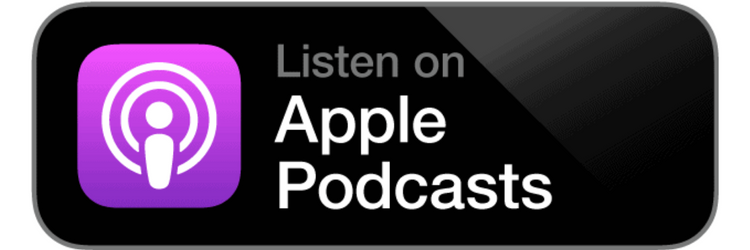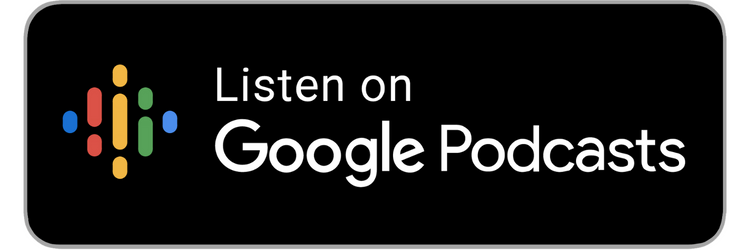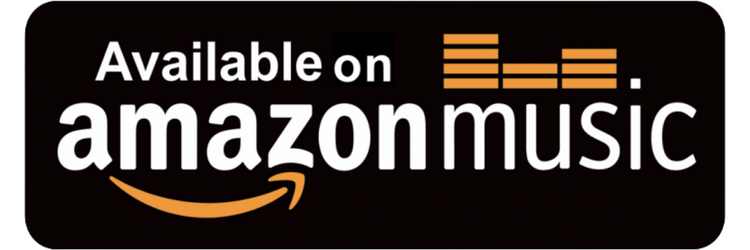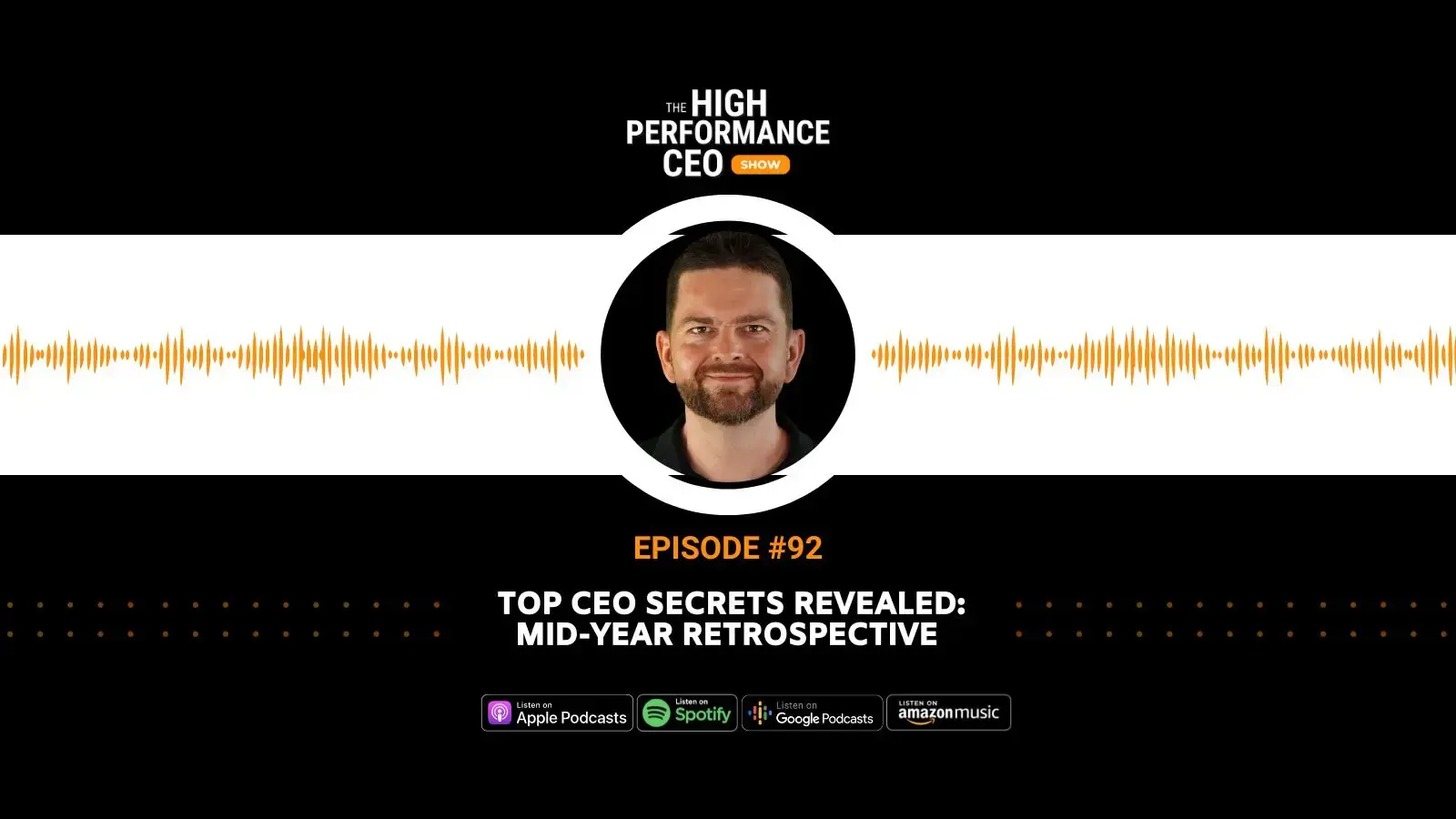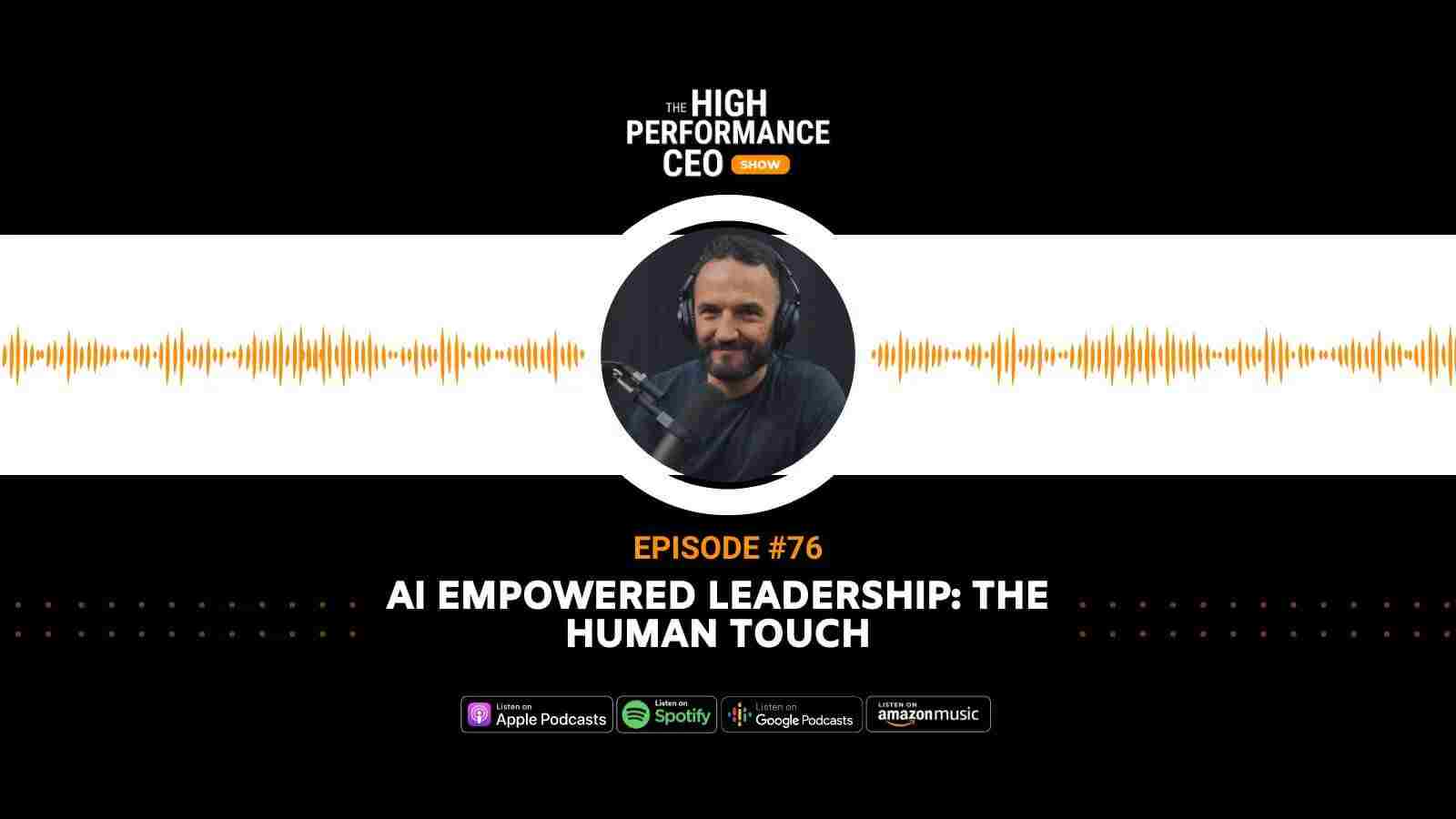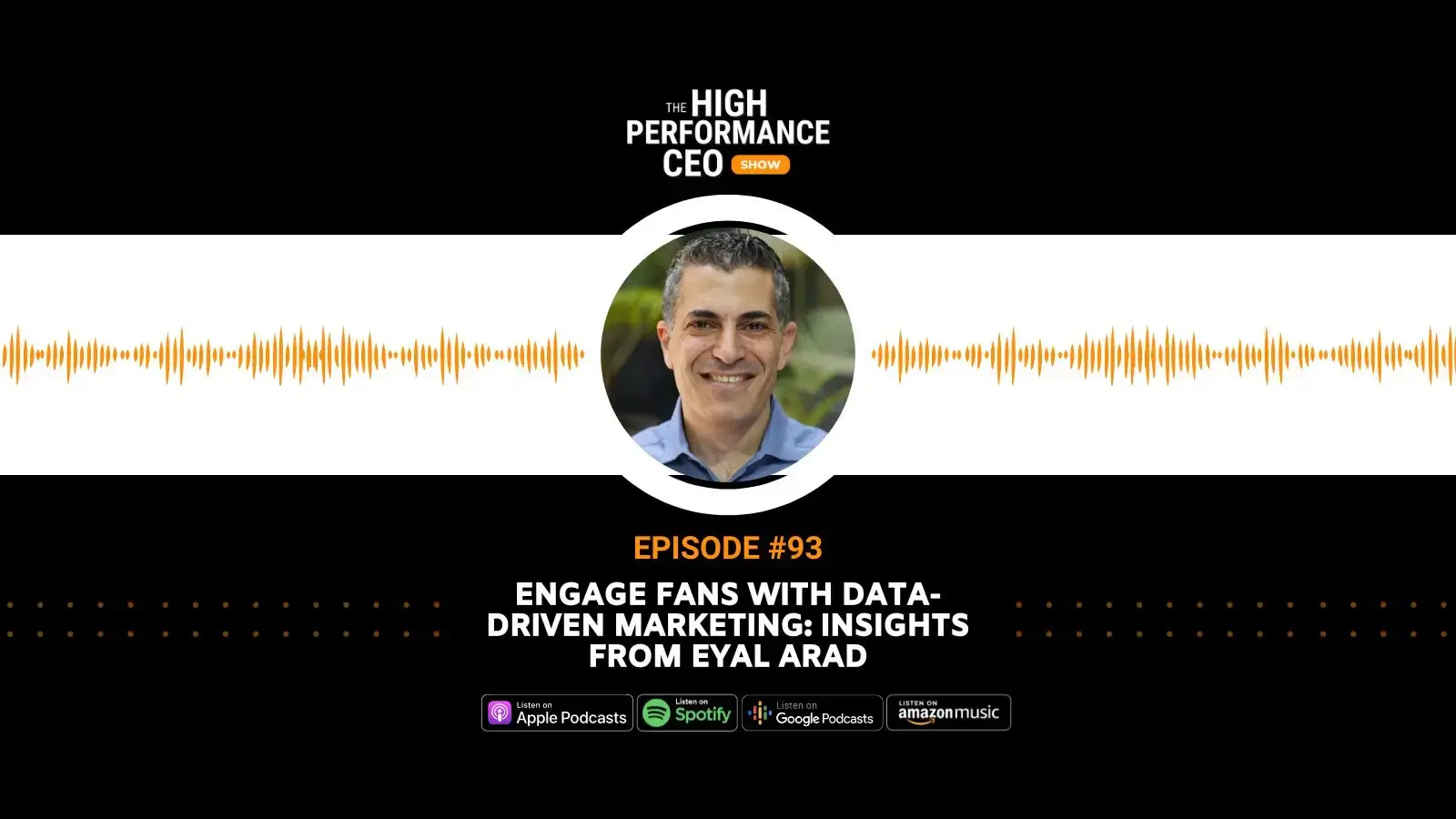19 min read
Enhance Leadership with Pronunciation: Expert Tips from Rebecca Bower
Sebastian Schieke
:
Jun 11, 2024 3:03:05 PM
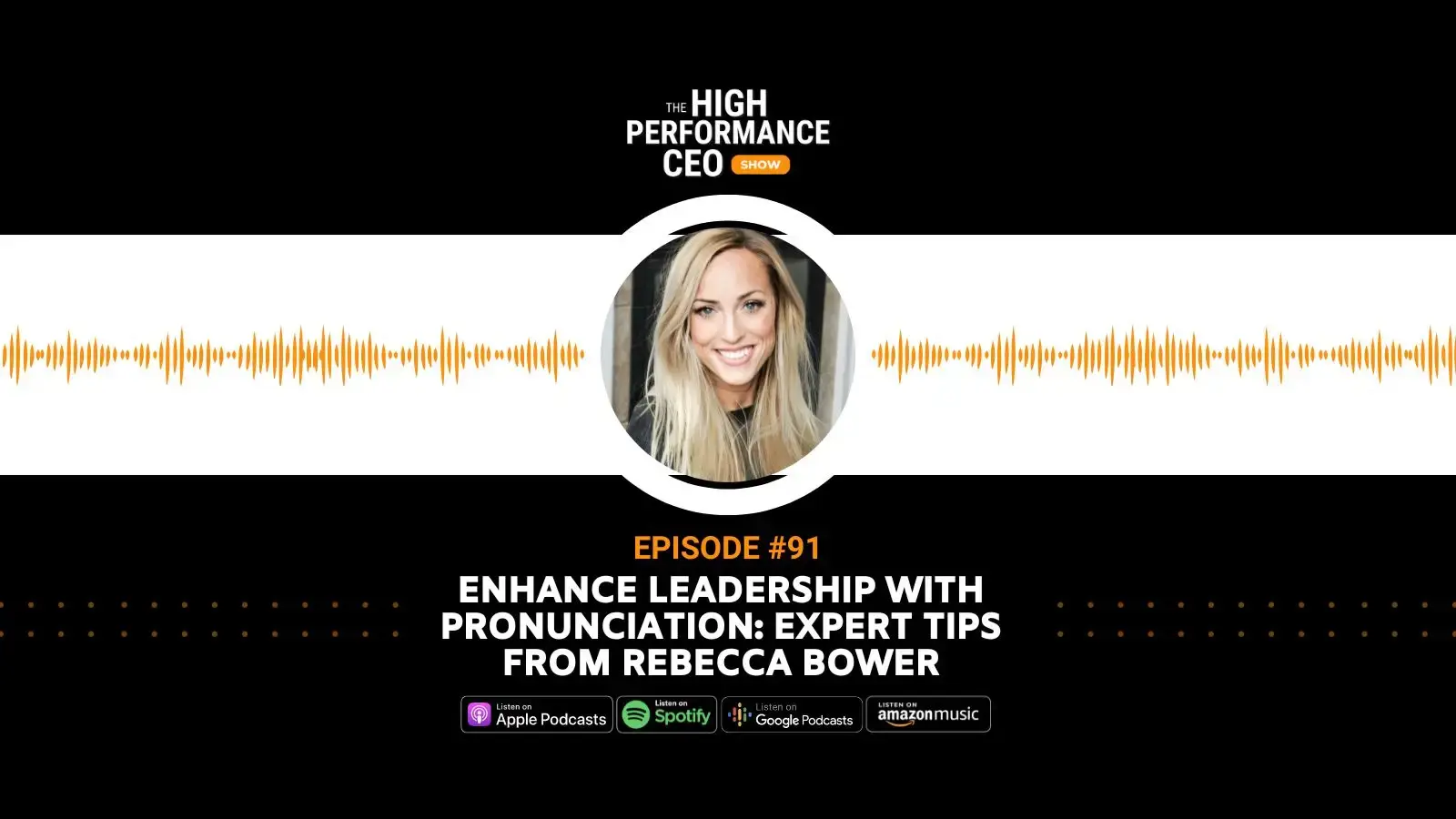
Episode Summary:
Rebecca Bower, a skilled speech pathologist, offers tips on improving English pronunciation to boost leadership. This episode covers practical strategies, key points, and real examples of how better speech can enhance executive presence. Perfect for CEOs, the episode aims to improve communication skills for career growth and stronger professional relationships.
About Rebecca Bower:
- Top Speech Pathologist: Rebecca Bower is a respected speech pathologist with years of experience helping people improve their communication skills.
- Expert in English Pronunciation: Rebecca specializes in accent modification and clear pronunciation. Her practical techniques have helped many professionals speak with precision and confidence.
- Proven Success: Rebecca has a track record of transforming clients' professional images, boosting their leadership skills and careers.
Key Takeaways:
- Clear pronunciation improves leadership effectiveness.
- Refined speech boosts executive presence and confidence.
- Enhanced communication skills foster career growth.
- Confident speech leads to stronger professional relationships.
- Practical techniques enhance precise and confident speech.
- Better pronunciation skills can transform professional images.
Why It's Important for CEOs Like You
For CEOs, clear communication is a must. It impacts their ability to lead and inspire. This episode is a great resource for CEOs who want to improve their executive presence and professional relationships. It stresses the importance of clear pronunciation. This helps leaders share their vision with precision and confidence.
The episode tackles common CEO challenges like overcoming speech barriers, managing diverse teams, and staying clear and authoritative in high-stakes situations. Rebecca Bower offers practical solutions and techniques that CEOs can use right away for real improvement. By focusing on clear speech and strong communication skills, the episode shows how these can boost career growth, build strong connections, and transform a leader's image.
What CEOs Can Start Doing
- Practice clear and precise pronunciation regularly.
- Implement techniques to boost executive presence.
- Engage in confidence-building communication exercises.
- Focus on enhancing your speech for professional growth.
- Tailor communication strategies to diverse team needs.
- Maintain authority and clarity in high-stakes situations.
- Apply Rebecca Bower's practical solutions immediately.
- Monitor progress and adjust techniques as needed.
Conclusion
In this episode titled, "Enhancing Executive Communication: Insights with Rebecca Bower," we explore the key elements of effective leadership communication. Clear pronunciation, maintaining authority in diverse teams, and practical solutions for immediate improvements are the main points.
These insights are vital for CEOs who want to boost their presence and advance their careers. By following the action items, leaders can refine their speech, build stronger relationships, and improve their executive presence. Start applying these techniques today to transform your leadership communication.
Chapters
Clear Communication 00:01 - 01:27
Rebecca Bower starts by sharing her journey as a speech pathologist focused on English pronunciation. She talks about why clear communication matters globally and her passion for pronunciation.
Pronunciation for Career Growth 01:27 - 05:50
Rebecca explains how pronunciation impacts professional success. She highlights its effect on confidence and career progress. She also discusses how non-native speakers view their language skills and the effects of mispronunciations.
Overcoming Speech Challenges 05:50 - 09:46
The talk moves to common pronunciation issues non-native speakers face and their psychological effects, like reduced confidence and communication problems.
Speech Techniques for Mastery 10:24 - 20:59
Rebecca shares techniques for better English pronunciation. She focuses on feedback, targeted practice, and how pronunciation training differs from traditional language teaching.
Success Stories 21:03 - 25:52
Real-life examples show how improved pronunciation changes lives, boosting both professional success and personal confidence.
Effective Communication Steps 27:32 - 30:20
The podcast ends with a summary, resources for further improvement, and information on Rebecca’s services and educational content.
Read the full transcript here
-
Transcript
Sebastian (00:01.327)
Hey Rebecca, welcome to the show.
Rebecca (00:04.656)
Sebastian it's a pleasure to be here.
Sebastian (00:07.215)
Yeah, we know each other for a while now and I was always thinking, hey, I need to have Rebecca on my show because what you do is very important. We live in a global world and English is the language we all use.
Also, we all speak English and we all think we speak well English. There are subtle differences and this is where you come and help people like me to improve their accent, to get rid of some odd sounds and yeah, to make the way we speak more, how would you say more, I wouldn't say more understandable, but more,
Rebecca (00:56.304)
In some cases, yes, more understandable, but mostly for people that I work with, it's about confidence. Feeling a bit more confident when they're speaking English and knowing they're not making as many errors or mispronunciations, and just feeling good and fluent when they're speaking English as their second or third or fourth language, right?
Sebastian (00:58.703)
Yeah.
Sebastian (01:03.567)
Yeah, okay.
Sebastian (01:18.959)
And this is what you do. But maybe we start from, what's your story? So how did you became an English? Yeah. Yeah.
Rebecca (01:27.408)
Yes, get into this very interesting little niche. Well, it started actually, my original career is a speech language pathologist. So I have a master's degree in speech language pathology and I've worked in that area. So working with articulation and speech production and the...
anatomy and physiology of speech. And I've worked in many different areas of speech pathology. So I've worked with adults and pediatric populations in schools, in home, in hospitals, with post stroke rehab and a lot of different areas. It's kind of one awesome thing about this career. But my main love was always articulation, speech. I always loved that area. And...
I was very lucky, I would say, because sometimes things just happen by chance. I always loved the area of articulation, and accents and English pronunciation really kind of go hand in hand with that. And whenever I would tell someone what I did, and it could be anyone just in the grocery store.
Sebastian (02:28.335)
Mm.
Rebecca (02:46.032)
People would often ask me, can you help me with my English pronunciation? You know, I've been speaking English for a long time, but I really struggle with being understood or getting caught. Or I find when I'm speaking, people give me that face. Like they're not quite sure what I said and they're too polite to say. Or they just don't feel confident when they're speaking. And this would come up quite a lot.
Sebastian (02:57.743)
Yeah.
Rebecca (03:13.776)
And I knew it was something I could help these people with, but I wasn't an entrepreneur yet. So I would try to direct them in different areas of where they can go to get phenomenal help. So this isn't just an English teacher area, right? This is pronunciation is a little different. And I found it very difficult to find really good resources for them.
Sebastian (03:41.071)
Mm.
Rebecca (03:42.992)
it's just not a really big area of focus for a lot of definitely speech pathologists and even for English teachers because that's mostly a lot of grammar and improving your vocabulary and all of those areas. So I found it very difficult to find really good resources and it became kind of like a...
I don't want to say it was a focus of mine. Okay. I wasn't obsessed, but it came in a slight obsession. It's something. Yeah. It's something I love. Exactly. And, you know, and I found my way into starting my own.
Sebastian (04:09.583)
Sometimes we need obsession to really thrive and become successful.
Rebecca (04:23.728)
practice, private practice. And so into entrepreneurship, I delved. And it's been quite a journey since then. But that's what I focus on is English pronunciation. I work mainly with professionals, sometimes students as well, but typically professionals who've been speaking English for many years. But there's this one small boundary that gets in the way of either
moving up in their career, promotions, things like that, interviews, they find that that's where they struggle. For some people, if they're a student, they're smart, they're getting ahead of the game, and they understand that this is something they struggle with and want to deal with proactively. And a lot of people come to me just for just feeling more confident, and it's more of a personal learning goal than anything. Yeah.
Sebastian (05:20.783)
It's often a confidence. I mean, I went, we spent half a year in New Zealand with my family and I have two sons. And before that, well, I mean, they've been not so confident speaking in English, especially not in front of other people. And while we're there, I mean, this immediately changed, you know, after a short period of time, they communicated and it was just natural for them to pick up the phone and call someone, you know? And,
Rebecca (05:22.736)
Mm.
Rebecca (05:37.168)
Thank you.
Sebastian (05:50.543)
I think the biggest challenge what we have when we speak a different language is our confidence. We think that we don't sound well and we think people don't understand and they judge us and all these little thoughts in our head which in the end prevent us from reaching our potential and communicating freely.
Rebecca (06:13.04)
It's absolutely that. And, you know, it's funny because when it comes to English pronunciation or any language, right? So if I'm learning French, it makes sense that once I've mastered the language, I kind of want to maybe get myself to that higher level if that's part of my future. For some people,
their pronunciation doesn't affect them in any way. And that's amazing, right? So they feel confident just naturally because they're getting through and they're finding ways to maneuver any problems that might happen. But then there are others who every little kind of, you know, that face, that questioning face creates a feedback loop for them.
And for some people, unfortunately, it affects them in such big ways. Some people actually kind of stop saying specific words or they'll avoid topics altogether because they know that's going to come up and they're going to have an embarrassing moment. And for some people, they kind of start stop speaking to people or speaking to new people. So now it's starting to affect their social life.
speaking in meetings, that can affect, you know, whether you have these skills and you have this knowledge base and not being able to express that is just, I mean, I can't even really imagine how frustrating that would be really because you're now pushing down your skills, your knowledge, and you're not showing that to people. And so that can affect your career in such a huge way.
So yeah, confidence is a big part of it.
Sebastian (07:58.223)
Yeah, I remember when I was 20, you know, and I mean, I never really spoke English in the business context. I had my first project with an international organization and I'm a very sociable organization, so we had lots of fun. In the evening, people went out, went for a drink, you know, and then you're in a social context, you know, it's loud and you're on a bar and then you have a chat.
And then I remember that I formulated the answer in my head, you know, and then they already moved on to the next topic.
Rebecca (08:34.8)
Yes. yes. People say this to me all the time. By the time I figured it out, it's over. It's over. And now to bring it up just seems weird. And that's right because you're kind of translating in your head and there's a delay and there's vocabulary that you're trying to capture and then just the nerves of trying to get it out. Yeah.
Sebastian (08:40.015)
Yeah, the topic is...
Sebastian (08:56.175)
Yeah.
Rebecca (09:01.456)
And then you're just, you are left with not having communicated at all. And we don't want that problem. Yeah. And truthfully, I mean, most people, you know, and accents, it's fantastic. It's a lovely thing. It's a part of your culture and, and it's a part of your personality. Yeah. And so I mean, I would say for the most part, people are, are very accepting of it. There will be these moments possibly of miscommunications that could, you know, what,
Sebastian (09:06.031)
Yeah, we're very frustrating.
Sebastian (09:14.863)
Yeah, Arnold Schwarzenegger. Yeah.
Rebecca (09:28.464)
one person might think is a cute funny thing that happened to another person is like life -changingly horrible and a bad experience that they want to fix. So yeah, it just depends on who you are and under what context and how much this matters to you. But you're right, that happens. That happens a lot.
Sebastian (09:36.751)
Mm.
Sebastian (09:41.647)
Yeah.
Sebastian (09:46.416)
And it's like with everything, you know, it's all about practice. And when I remember how I grew up and when I went to school, we didn't have much speaking practice. I mean, we learned a lot and vocabulary and working with text and stuff. But hey, speaking, I mean, we never really opened our mouths, you know? And then when you had to present something and remember, we had a very...
very serious English teacher, you know, and always came back to me, hey, Sebastian, your pronunciation is wrong. You haven't done your homework. So, yeah.
Rebecca (10:24.848)
no.
Sebastian (10:25.935)
So this also doesn't help to build confidence and to enable people to speak.
Rebecca (10:29.072)
No.
Rebecca (10:33.84)
But I mean, even I would say kudos to your teacher though, because often they don't typically mention pronunciation, right? It's kind of an afterthought. And for most people that I work with...
there really was very little to no discussion of pronunciation. It was more of getting the vocabulary and just getting more fluency with your grammar and accuracy. So, you know, at least you had someone mentioning something, but unfortunately not in a positive way. The greatest.
Sebastian (11:09.199)
But hey, so when you work with people with different nationalities, so Germans, Italians, French people, I assume there are certain sounds and certain.
words they pronounce differently. Can you share some patterns? Because in the end, it's all about patterns which shape us. And what are typical patterns for these nationalities?
Rebecca (11:33.968)
Of course.
Rebecca (11:37.936)
Mm -hmm. Mm -hmm.
Rebecca (11:48.944)
Yeah, so I guess to start I would say, you know, it's very every language has what you would say a repertoire of sounds. So there are certain sounds that one language has there may be some crossover where there are sounds that are similar to another and there may be sounds that don't exist in the next language you're learning. And so that's the main issue that occurs with accents. So what's happening is...
Let's say in your first language you don't have what we call like a...
erotic R, er, right? So if your first language doesn't have that, then you're going to use the closest version of that sound that your brain knows and inserts it into those English words. And so that will happen with sounds, consonants, and vowels. It will happen with your intonation or the music of your speech. You're going to use typically the patterns of your first language into English. That causes trouble.
Sebastian (12:24.943)
Hello.
Sebastian (12:30.671)
Mm -hmm.
Rebecca (12:52.354)
for a lot of people, as well as stress patterns. So I might have a word like buffalo, and I'm stressing that ba instead of fallow, buffalo. And if I said buffalo, buffalo.
Sebastian (13:03.119)
buffalo, I'm thinking about steak.
Rebecca (13:08.528)
that will change the word so your stress rules can impact you being understood as well. There are a lot of little things as well as linking. So for some languages, every single syllable is exactly the same, receives the same kind of timing.
Sebastian (13:08.769)
Yeah.
Hmm.
Rebecca (13:24.752)
Whereas in English, we have a stress -time language. Some are longer than others. So some languages, if it's more of a what we call staccato, da -da -da -da -da -da, type of stress patterns, then if you insert that into English, even if your pronunciation is very good, those patterns of staccato -like stress and linking can impact you quite a lot.
So the other thing I would say about different languages that don't get into kind of specific patterns is even if, even if you do have a pattern of whatever your first language is, and there are typical differences,
Even if you do have that, it really does depend on your experience with your goal language. So what I mean by that is how long have you been surrounded by the native speakers of your second language?
has it been before puberty or after puberty? Did you spend most of your time with, let's say, English -speaking peers or with peers of your first language, maybe your family? Because those kinds of things impact. Did you have a nanny who spoke an entirely different language and you spoke with that person for most of your childhood? All of these little things. I even had people who spoke with their roommate who had a different accent for many, many years. They were very close.
And that impacted their pronunciation. So even though you might have a pattern of your first language, you're impacted by what you're around and the environment of the languages you hear, at least for if it takes many years. So yeah, complicated and fun. Yeah, yeah. But here, I'll get into that. Okay, so.
Sebastian (15:13.839)
Sounds very complicated. So many things to think about, you know.
Rebecca (15:26.384)
I would say, you know, typically, typically, I'll have a lot of clients from all over the world. So there are a lot of somewhat similar patterns, of course. Let's say Hindi and Urdu speakers. The airflow of a lot of the sounds of English are quite different. So when we say sounds with P, like paper or T, today, and K, like,
can. We have like an airflow, a puff of aspiration, and our tongue tends to be more forward for this pronunciation. And for those other languages, what happens there is there isn't this plosive airflow and their tongue is a little further back. So that pronunciation of pt comes out as entirely different. So the p will sound like b.
which can, to an English speaking ear, sound like a bee. And the T and the D are different. Yeah, R is quite common. I mean, it really depends on your first language, but pretty much most languages have some struggle with this American R, whether it be Mandarin and Chinese speakers.
Sebastian (16:29.519)
Yeah, then it gets a bit awkward.
Rebecca (16:52.08)
German speakers, Russian speakers, I mean really, pretty much everywhere. There's at least one area of R, and R is complex, but it's just quite an American sound, right? And then also, if you consider, let's say English speakers in India, their English is influenced a lot by the British pronunciations. So those Rs are...
Sebastian (16:57.167)
Yeah, I'm one of those.
Rebecca (17:21.616)
not rhotic. They're essentially dropped at the ends of vowelized... I don't want to get into too much complex there, but a lot of those Rs are dropped. And so that's that British element in their English. And so, you know, all of these things can add up to be quite an issue. Yeah, it is. It is complex.
Sebastian (17:40.879)
complex.
So I guess you wrote a book or a few books about that and put all these theory into a very comprehensive piece of work. I have to admit for me, it's very hard to really find the time and the peace to read such a book and to...
Okay, I have to pronounce this. And first I have to learn the language. I mean, how you write these pronunciation patterns and then really get this in my head. So how would you work with someone like me, you know, and when you say, okay, your R really sucks and your TH can really improve.
Rebecca (18:28.368)
Right, so with, I mean with the book, it's difficult because I'm trying to provide the information that...
everyone from almost any language would want to know about English. So, you know, you might specifically only have a couple sounds that you'd focus on, whereas another first language would be different. And so I kind of have to cover a lot more material in the book. So it does kind of umbrella a lot of information.
Usually what happens is when I work with someone, I'm doing an assessment. So I'm not just listening to your speech, but I'm kind of, I take recordings and I analyze them, listening very specifically for certain changes in specific consonants and vowels and listening for linking and intonation and stress patterns that might be a bit different. And then,
The next step is really trying to formulate a plan that gives you the biggest results. If you were to work on these few things rather than everything, how would that impact your speech in a much bigger way and create significant changes in your speech rather than, I think what most people do is they just try to learn everything and they listen to English and they repeat English and they're constantly immersing themselves.
but they don't necessarily know what to listen for.
Sebastian (20:01.743)
Yes.
Rebecca (20:01.936)
And it's overwhelming. I mean, I would be overwhelmed too. It's too much. So I think, you know, if you don't have the benefit of, let's say, a speech language pathologist in your area, or an English instructor who happens to understand pronunciation, and you can't get an assessment to identify your specific issues, then you're kind of left with self analyzing or doing a lot of research on what are typical issues of your language. And maybe you can
Sebastian (20:07.215)
It's a -
Rebecca (20:31.89)
you can focus that way. Usually, yeah, yeah, exactly, you could do that too. Usually though, I will say, like, can you think of a few words that when you say them to English speakers, you will pretty much, you don't have to say the word, but can you think of a few words where you know you're going to be like struggling with that particular word or you know someone's going to look and question the word?
Sebastian (20:33.871)
Or I can hop on a Zoom call and speak with you.
Rebecca (20:59.696)
You don't just like a yes no answer. You don't have to say the word. Can you think of any?
Sebastian (21:03.439)
You know, I had German words where, because I have to, I grew up in East Germany and there we have a very strong accent. And after I moved to the Western part of Germany, right after the war came down, hardly anyone could understand me.
Rebecca (21:21.68)
Even the dialect difference, yeah.
Sebastian (21:23.247)
Yedidalek was so strong, you know. And then now after 30 years, people ask me, where I'm from. And I say, I'm from this region of Germany. And they say, you don't listen like someone from there, you know? I said, yes, well, I mean, and I always say, well, you know, they put me into a language camp. And they only let me out when I changed my language.
Rebecca (21:40.528)
So yeah, you've definitely made some adjustments, right?
Rebecca (21:52.976)
Are you serious? boy.
Sebastian (21:55.663)
And it was quite a, as a young, as a teenager, it was quite tough for me to, and people didn't understand what I was saying. So I really had to, like learning, changing the accent in a different language. At first I had to change my accent in my first language. Yeah.
Rebecca (22:03.472)
Yeah. You've had that experience. Yeah.
Rebecca (22:11.824)
Frustrating. Yeah.
Rebecca (22:20.208)
your first language changed the dialect. Yeah, I mean that and that occurs, you know, in the US as well. And in Canada too. But what I would say is for most people, if you can identify a few words that you know, you're going to be misunderstood with, analyze that, find any similarities. Are there certain sounds that are similar? Are there...
r's for example or th's in all of those words or l's or something specific about the vowel you can usually identify what the problem is you can do it yourself okay so there is some element there that you could learn yourself but if you want fast results and and kind of a focused plan then coaching is probably what you're looking for if the goal is important to you you know
Sebastian (23:05.807)
Yeah. Well, I mean, if you run a business, if you have limited time, then often you need to, yeah, basically write a check for speed and get...
Rebecca (23:15.492)
Absolutely. Yeah. Yeah. And so, you know, with, with a lot of the clients that I work with, we are really just honing in.
Sebastian (23:24.751)
Mm -hmm.
Rebecca (23:25.296)
If there are a few main issues that are causing the majority of your problems, so it's that 80 -20 rule, like let's spend our time and zero in on the big problems, get those dealt with because it's not that difficult. It really isn't if you just focus on a few. Where the problem arises is when you don't know what your problems are.
And then you don't exactly know how to fix that and you don't have a plan. So you're just learning everything together. You get overwhelmed because it's overwhelming and then you give up. And that's why I think a lot of people will tell each other that it's just not doable. It's not possible. That's something that people tell each other, right? It's just, you can't change that. It's just accept it and move on, but it's absolutely something you can improve in a very big way. Just need to know the way.
Sebastian (24:06.991)
Yeah, people need feedback.
Sebastian (24:18.735)
People need feedback. And I found myself when I do a recording and do a transcription from the software, and the transcription is not right. There's something completely odd. There's a, OK, I have to change the way how I pronounce this word, because if the computer cardinist sent me, probably someone else can't either.
Rebecca (24:30.16)
Yeah. Yes.
Rebecca (24:37.264)
You
Rebecca (24:42.704)
Yep. Yeah, if AI is having trouble understanding you, right, Siri doesn't get it. I mean, that happens quite a lot. That actually, it's funny, that was one client. She had said, I'll know when we've made some good improvements, when Siri understands everything I say. But you're right, it's a good feedback to identify your issues too. Yeah.
Sebastian (25:07.727)
So you basically work with people on a one -to -one basis. You analyze their challenges, their patterns, create a plan, and then using the 80 -20 rule, work on these individual points and to knock them out forever.
Rebecca (25:27.184)
Yes. So the way I look at it is a bit more analytical. I like to look at the data of your speech, kind of pull it into numbers. So the way I like to look at it is what percentage can we improve each and every one of those main goals? And we can do that by pre and post assessment and really identify that. And then, you know, when we're done a program,
Sebastian (25:31.471)
Mm -hmm. Yeah.
Rebecca (25:52.112)
Even from there, even if you've made significant changes, you know what you can continue focusing your time on. You know what to do. We're just going to spend our time on this one thing.
And really when it comes to instruction, it's very simple. It's a simple process, but it takes time. It takes time and it takes understanding. So we are working on getting you to not only understand what your issue is, so let's say it's R, that's a struggle sound, we're going to know how to create that sound in a very consistent way. And once you can do that, we're moving on. We're going to go to word level and phrase level and sentence level, the reading and then conversation.
And I think for a lot of people, they want to jump. Of course you want to jump. You want to use what you know. So you know how to say the sound maybe very well. And maybe even in a couple words, you can say that sound well. But when it comes to conversation, it just does not come out. It doesn't translate. And that's because we're skipping some steps that we need to master before we get to that conversation level. And that's usually where...
Sebastian (26:39.439)
Of course.
Sebastian (26:44.655)
Mm -hmm.
Rebecca (27:02.288)
I mean, I help people with all those levels, but usually that's the big problem is like, how do I use this in a functional way every day in my conversations, in my work meetings, and then feel good about how I'm doing that? So, yeah.
Sebastian (27:06.991)
Mm hmm. Yeah.
Sebastian (27:19.311)
Amazing. I'm looking forward to you analyzing our conversation and sending me a list of many items I should focus on in the future.
Rebecca (27:23.6)
Hahaha.
Rebecca (27:28.272)
specific things.
Sebastian (27:32.815)
Very good, very good. Any special place where people can find you? I guess you are active on LinkedIn, Facebook, the usual places.
Rebecca (27:42.8)
Yeah, I spend most of my time right now one -on -one coaching and I'm expanding a little bit to YouTube. I just started YouTube. So it's like a year in, so you know, no judges on my early work. But if you're looking just for...
some free instruction and just getting an idea of the kinds of knowledge and skills that you can develop. And there's a lot of practice there. You can go to my YouTube channel, it's Proactive Pronunciation. So that's lots of resources there. And then on my website, you'll have access to, I do have a book that has pretty much everything you're looking for for English pronunciation and an audio book, which is on audible.
Sebastian (28:01.487)
Mm -hmm.
Rebecca (28:25.968)
And I do have a couple courses now, so I've got some really good video work. For those who maybe coaching just is not in your budget, that's a lot of people. So.
I want to make sure that I can give that information and you can develop those skills yourself through some video coaching because it's explaining everything very clearly and you have that model and I kind of, I know exactly what it is that most people end up struggling with. Like where to place their tongue. The reason that sound comes out different is because your tongue is too high. We're just going to lower it and this is how you do that and this is how you know if you did it right. And it's ear training and practice. So all of that is
in there in the course. And so my website is proactivepronunciation .com.
Sebastian (29:14.447)
and everyone who didn't write it down, we will put it of course in the show notes where people can contact you and yeah, hopefully find ways to improve their pronunciation. I know there are many people who could use such a service and I can only highly recommend Rebecca and her work. It's really a pleasure and thank you so much.
Rebecca (29:18.268)
Yeah.
Rebecca (29:31.152)
Mm -hmm.
Sebastian (29:43.695)
all your time today and all these. Yeah, it's been a fun, fun conversation. And yeah, as I said, we will put everything in the show notes and reach out to Rebecca. Check out her courses. If you want to get down into the details, have a look at this amazing book. And yeah.
Rebecca (29:45.936)
It's been fun. It's been a pleasure. Thanks for having me.
Rebecca (30:11.216)
Fantastic.
Sebastian (30:12.719)
Thanks so much and enjoy the rest of your day.
Rebecca (30:17.104)
I absolutely will. Thank you for having me.
Sebastian (30:20.591)
Thanks for being here.
